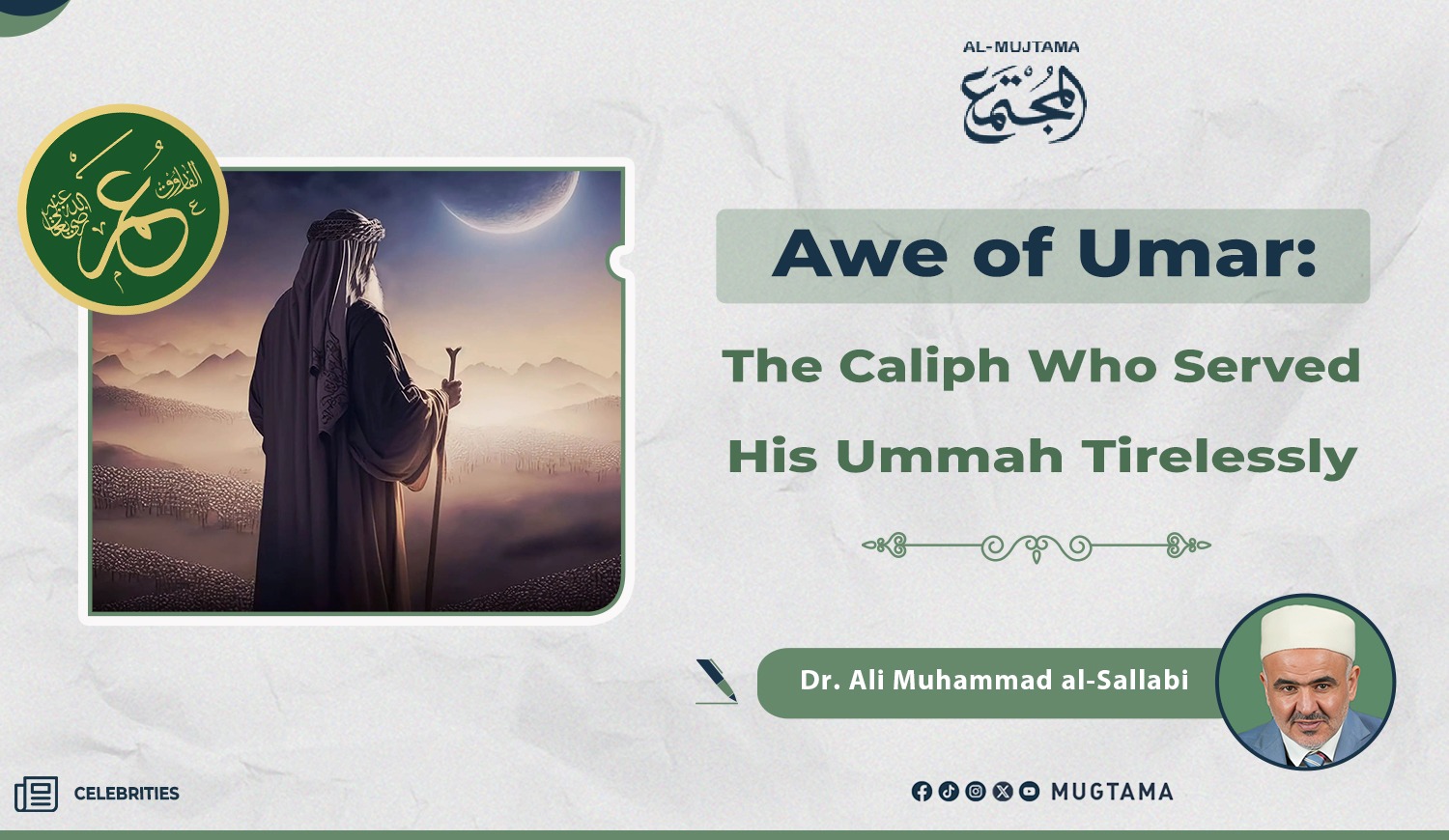Leadership Rooted in Mercy
Awe of Umar: The Caliph Who Served His Ummah Tirelessly

Umar's Imposing Presence and Khalid's Submission
Umar ibn al-Khattab (may Allah be pleased with him) held sway
over souls and hearts, inspiring an awe that curbed desires and controlled
impulses. The clearest evidence of this was his dismissal of Khalid ibn
al-Walid (may Allah be pleased with him) at the peak of his fame, despite
Khalid's consistent victories in every battle and the immense respect and
admiration surrounding him. Umar executed the order of his dismissal at a time
when people most needed him. The order of dismissal arrived while the Muslim
armies were lined up against the Roman forces on the Day of Yarmouk. Umar
appointed Abu Ubaidah as the commander of the armies. Khalid said, "We
hear and obey the Commander of the Faithful." When one of the soldiers
pointed out that this change could cause dissent, Khalid replied, "There
is no room for dissent as long as Umar is present." (Al-Murtada,
Al-Nadwi, p. 107).
Umar's Authority and the Incident of
the Woman
If this indicates Khalid's submission to the Caliph's command, despite being a victorious and beloved leader – and his humble and selfless
relinquishment of leadership, a rare occurrence in the history of military
commands and wartime emirates, it also signifies Sayyiduna Umar's authority and
firm grip on affairs. He commanded immense awe in people's hearts. Al-Hasan
al-Basri narrated that Umar ibn al-Khattab was informed about a woman about
whom men were talking. He sent for her – and Umar was a man who inspired awe.
When the messenger reached her, she cried, "Woe to her! What has she to do
with Umar!" She went out, and labor pains struck her. She passed by some
women who recognized her condition, and she gave birth to a boy who cried once
and then died. When this reached Umar, he gathered the Muhajirun and Ansar and
consulted them. At the end of the gathering was a man. They said, "O
Commander of the Faithful, you were merely disciplining, and you are only a
shepherd." Umar asked, "What do you say, O so-and-so?"
The man replied, "I say: if the people followed you based on your
desires, then by Allah, they did not advise you sincerely! And if their
judgment showed them otherwise, then by Allah, their opinion was mistaken, O
Commander of the Faithful!" Umar then said, "I implore you, stand
up and distribute it among your people." When Al-Hasan was asked who
the man was, he replied, "Ali ibn Abi Talib." Ali, Uthman, Talha,
Zubayr, Abd al-Rahman, and Sa'd (may Allah be pleased with them all) gathered.
(Sirat Umar ibn al-Khattab, Ali al-Sallabi, p. 143).
Abd al-Rahman ibn Awf's Plea and
Umar's Balancing Act
The boldest among them with Umar was Abd al-Rahman ibn Awf.
People said, "O Abd al-Rahman, why don't you speak to the Commander of
the Faithful on behalf of the people? When someone comes seeking a need, his
awe prevents him from speaking to him until he leaves, his need unmet."
So, Abd al-Rahman went in and spoke to him about it. Umar said, "O Abd
al-Rahman, I implore you by Allah! Did Ali, Uthman, Talha, Zubayr, Sa'd, or
some of them, order you to do this?" He replied, "Yes, by
Allah." Umar said, "O Abd al-Rahman, by Allah, I was lenient
with people until I feared Allah in my leniency, then I became strict with them
until I feared Allah in my strictness. Where is the way out?" Abd
al-Rahman stood up, weeping, dragging his garment, and saying with his hand,
"Woe to them after you! Woe to them after you!"
The Awe-Inspired by Umar in Daily
Life
Umar ibn Murrah narrated: A man from Quraish met Umar and
said, "Be lenient with us, for you have filled our hearts with
awe!" Umar asked, "Is there any injustice in that?"
The man replied, "No." Umar then said, "May Allah
increase my awe in your hearts." Abdullah ibn Abbas narrated, "I
stayed for a year wanting to ask Umar (may Allah be pleased with him) about a
verse, but I could not ask him out of awe." Ikrimah, the freed slave
of Ibn Abbas, narrated that a barber was cutting Umar ibn al-Khattab's hair, and
Umar was a man who inspired awe. Umar cleared his throat, and the barber soiled
himself. Umar ordered forty dirhams for him. When Umar saw the intensity of his
awe in people's hearts, he would say, "O Allah, You know that I fear
You more than they fear me!" (Manaqib Umar by Ibn al-Jawzi, p. 135).
Umar's Diligence in Addressing
People's Needs
Ibn Abbas said: "Whenever Umar (may Allah be pleased
with him) finished a prayer, he would sit for the people. If anyone had a need,
he would attend to it. One time, he prayed several prayers without sitting
afterward. So I went to the door and said, 'O Yarfa! Is the Commander of the
Faithful unwell with any ailment?' He said, 'No.' While I was there,
Uthman came. Yarfa went in and then came out to us and said, 'Stand up, O son
of Affan! Stand up, O son of Abbas!' We entered upon Umar, and before him were
piles of money. He said, 'I have looked, and I have not found anyone in Medina
with a larger clan than you two. So take this money and divide it among the
people. If there is any surplus, return it.' I knelt on my knees and said, 'And
if there is a deficit, will you return it to us?' He said, 'That's a familiar
trait from Akhzam! Where was this when Muhammad (peace be upon him) and his
companions were eating dried meat?' I said, 'If Allah had opened up
[resources], he would have done something other than what you are doing.' He
asked, 'And what would he have done?' I said, 'Then he would have eaten
and fed us.' He then sobbed until his ribs shook and said, 'I wish I had come
out of this matter with nothing against me and nothing for me.'"
(Al-Shaykhan in Al-Baladhuri's narration, p. 221).
Umar's Austerity and Adherence to
Predecessors' Path
Sa'id ibn al-Musayyib narrated: A camel from the spoils of war
was killed. Umar (may Allah be pleased with him) slaughtered it and sent some
to the wives of the Prophet (peace be upon him). He prepared the rest and
invited a group of Muslims to eat, among whom was Al-Abbas ibn Abd al-Muttalib.
Al-Abbas said, "O Commander of the Faithful, if only you would do
something like this for us every day, so we could eat with you and
converse!" Umar replied, "I will not do anything like this
again. My two companions have passed away, and they acted in a certain way and followed a specific path. If I act differently from their actions, I will be led
away from their path." (Al-Tabaqat al-Kubra, Ibn Sa'd, 3/288).
Umar's Concern for the Vulnerable and Just
Governance
Aslam, Umar's freed slave, narrated: Umar appointed a freed
slave of his over a protected grazing area (hima) and said, "O Hani! Lower
your wing to the Muslims, and beware of the prayer of the oppressed, for it is
answered. Allow the owner of the small flock and the small herd [to graze], but
beware of the camels of Ibn Awf and Ibn Affan. For if their livestock perish,
they will return to cultivation and date palms. But if the owner of the small
flock and the small herd loses his livestock, he will come to me with his
children and say, 'O Commander of the Faithful, am I to abandon them?' May you
be without a father! Water and pasture are easier for me than gold and silver.
By Allah! They truly believe I have wronged them. Indeed, these are their lands
for which they fought in Jahiliyyah, and upon which they embraced Islam. By Him
in whose hand is my soul! Were it not for the wealth I carry for the sake of
Allah, I would not have protected a single span of their lands from them."
Umar's Enforcement of Quranic Principles
Musa ibn Anas ibn Malik narrated that Sireen – the father of
Muhammad ibn Sireen – asked Anas for a manumission contract, but Anas, who was
wealthy, refused. So, Sireen went to Umar, who said, "Manumit him."
When Anas refused, Umar struck him with his whip and recited: "So write a
contract for them if you know any good in them" (Quran 24:33). So, Anas
manumitted him. (Tarikh al-Dhahabi: Era of the Rightly Guided Caliphs, p. 272).











